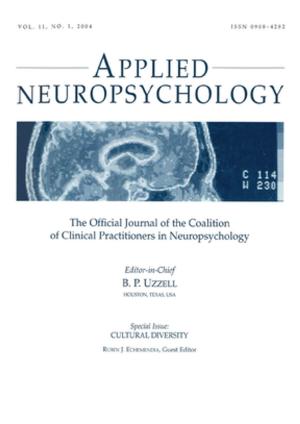Recovery of the Lost Good Object
Nonfiction, Health & Well Being, Psychology, Research, Psychoanalysis, Psychotherapy| Author: | Eric Brenman | ISBN: | 9781134131358 |
| Publisher: | Taylor and Francis | Publication: | August 6, 2012 |
| Imprint: | Routledge | Language: | English |
| Author: | Eric Brenman |
| ISBN: | 9781134131358 |
| Publisher: | Taylor and Francis |
| Publication: | August 6, 2012 |
| Imprint: | Routledge |
| Language: | English |
Recovery of the Lost Good Object brings together the hugely influential papers and seminars of Eric Brenman, revealing his impact on the development of psychoanalysis and allowing a better understanding of his distinctive voice amongst post-Kleinian analysts.
Gathered together for the first time in one volume, Eric Brenman's papers give the reader a unique insight into the development of his clinical and theoretical thinking. They highlight many issues which are relevant to the present debate about psychoanalytic technique, including:
- The Narcissism of the Analyst
- Hysteria
- The Recovery of the Good Object Relationship
- Meaning and Meaningfulness
- Cruelty and Narrowmindedness
- The Value of Reconstruction in Adult Psychoanalysis
The second half of the book documents three of the clinical seminars and covers the transgenerational transmission of trauma, the analysis of borderline pathology and the psychoanalytical approach to severely deprived patients.
This collection will be welcomed by all psychoanalysts and psychotherapists, and other members of the helping professions interested in investigating the valuable contribution that Eric Brenman has made to contemporary psychoanalysis.
Recovery of the Lost Good Object brings together the hugely influential papers and seminars of Eric Brenman, revealing his impact on the development of psychoanalysis and allowing a better understanding of his distinctive voice amongst post-Kleinian analysts.
Gathered together for the first time in one volume, Eric Brenman's papers give the reader a unique insight into the development of his clinical and theoretical thinking. They highlight many issues which are relevant to the present debate about psychoanalytic technique, including:
- The Narcissism of the Analyst
- Hysteria
- The Recovery of the Good Object Relationship
- Meaning and Meaningfulness
- Cruelty and Narrowmindedness
- The Value of Reconstruction in Adult Psychoanalysis
The second half of the book documents three of the clinical seminars and covers the transgenerational transmission of trauma, the analysis of borderline pathology and the psychoanalytical approach to severely deprived patients.
This collection will be welcomed by all psychoanalysts and psychotherapists, and other members of the helping professions interested in investigating the valuable contribution that Eric Brenman has made to contemporary psychoanalysis.















